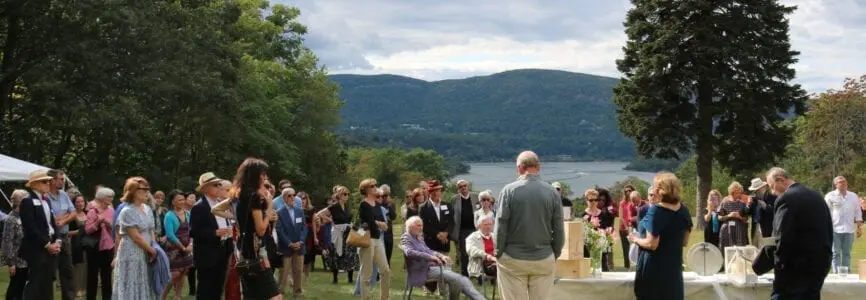Hastings Center News
Hastings Kicks Off 50th Anniversary Celebrations
The Hastings Center, a pioneer in the field of bioethics, marked its 50th anniversary with an outdoor party on September 7. The kick-off event, held at its campus in Garrison, N.Y., was the first of a series of programs honoring The Hastings Center’s work past and present and looking ahead to the future.
Bioethics is a field that examines social and ethical issues raised by advances in science and technology.
“We are facing a tsunami of innovation that is moving so fast individuals, institutions and governments cannot keep up,” said Hastings president Mildred Z. Solomon in remarks to more than 100 friends and colleagues, including cofounder Willard Gaylin, as well as present and former Hastings Center staff members, other ethics leaders, supporters, and researchers.
“Advances in genetics, assisted reproductive technologies, neuroscience, synthetic biology, nanotechnologies, and artificial intelligence are galloping forward,” Solomon said. “But no technology is neutral. And in all these cases, it will be essential to consider how best to integrate these technologies.”
The Hastings Center was founded in 1969 by Gaylin, a psychiatrist, and Daniel Callahan, a philosopher, who died in July. Originally called the Institute of Society, Ethics, and the Life Sciences, the research institute was renamed The Hastings Center after its first home in Hastings-on-Hudson, N.Y., just north of New York City.
“We are here to celebrate something that is rather remarkable—the 50th anniversary of a small but mighty organization whose main products are ideas,” said Hastings chairman of the board Brad Gray.
The center was created to address ethical questions raised by rapid advances in life sciences and technology. Technologies such as ventilators, for example, restored many critically ill people to good health, but they also kept gravely ill patients alive indefinitely, some thought, for too long. Genetic testing opened prospects for identifying risk factors for disease and addressing them early. But it also raised concerns about privacy and discrimination.
People’s attitudes were changing, too. Patients began questioning their doctors’ orders. “I envisioned an organization that embraced the disciplines of many scientific and humanistic fields and aimed for an audience that included the public as well as practitioners,” wrote Callahan in Hastings Bioethics Forum.
The anniversary events continue September 26 with a Mudd Center keynote address in The Ethics of Technology series by Hastings Center director of research Josephine Johnston at Washington and Lee University. The title of her lecture is “The Good Parent in an Age of Gene Editing: How Novel Genetic Technologies Challenge Parental Responsibility.”

